Mediation as a Mode of Dispute Resolution
Introduction:

Mediation is a widely recognized and effective mode of dispute resolution, gaining popularity in various industries and scenarios due to its potential to foster amicable and mutually acceptable solutions to conflicts. As a neutral and voluntary process, mediation empowers disputing parties to actively engage in constructive dialogue, encouraging open communication, empathy, and creative problem-solving. This chapter aims to thoroughly elucidate the concept of mediation, its underlying principles, and its diverse applications across different industries. We will delve into real-life case studies and examples to highlight the effectiveness of mediation in resolving conflicts. Moreover, we will discuss the potential advantages and limitations of mediation as a dispute resolution method, considering factors such as power dynamics, cultural considerations, and the potential for win-win outcomes. Throughout this chapter, relevant research findings, theories, and expert opinions will be incorporated to provide a comprehensive and well-rounded analysis of mediation as a mode of dispute resolution.
Definition:

Mediation is a voluntary and confidential process that involves a neutral third party, the mediator, facilitating communication and negotiation between disputing parties to reach a mutually satisfactory agreement. The mediator’s role is to guide the process, promote understanding, and assist the parties in exploring their interests and needs to arrive at a resolution that benefits both sides. Unlike litigation or arbitration, mediation does not impose a decision on the parties; instead, it empowers them to take ownership of the resolution and maintain control over the outcome.
Key Principles of Mediation:
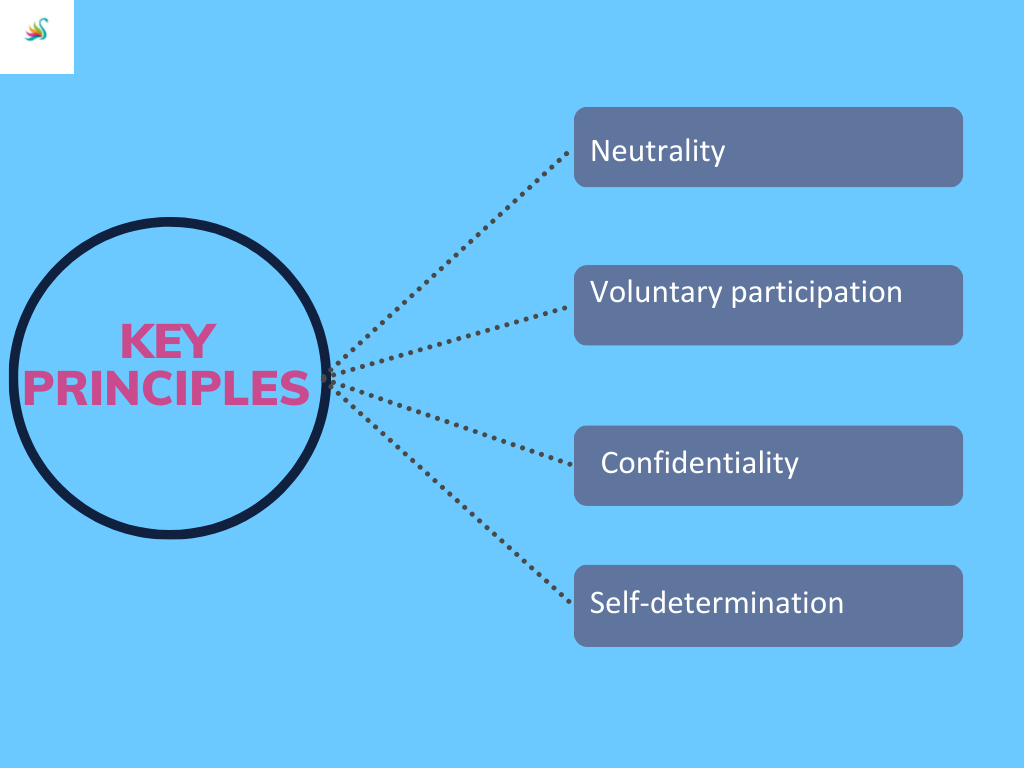
Neutrality: Mediators remain impartial and neutral, avoiding any bias toward either party, ensuring a fair and balanced process.
Voluntary participation: Mediation is a non-coercive process, and all parties must willingly agree to participate.
Confidentiality: Discussions and information shared during mediation are generally confidential, fostering an environment where parties can be open and honest without fear of repercussions.
Self-determination: The parties have the autonomy to decide the terms of the agreement and determine whether they will reach a settlement or not.
Applications of Mediation Across Industries:
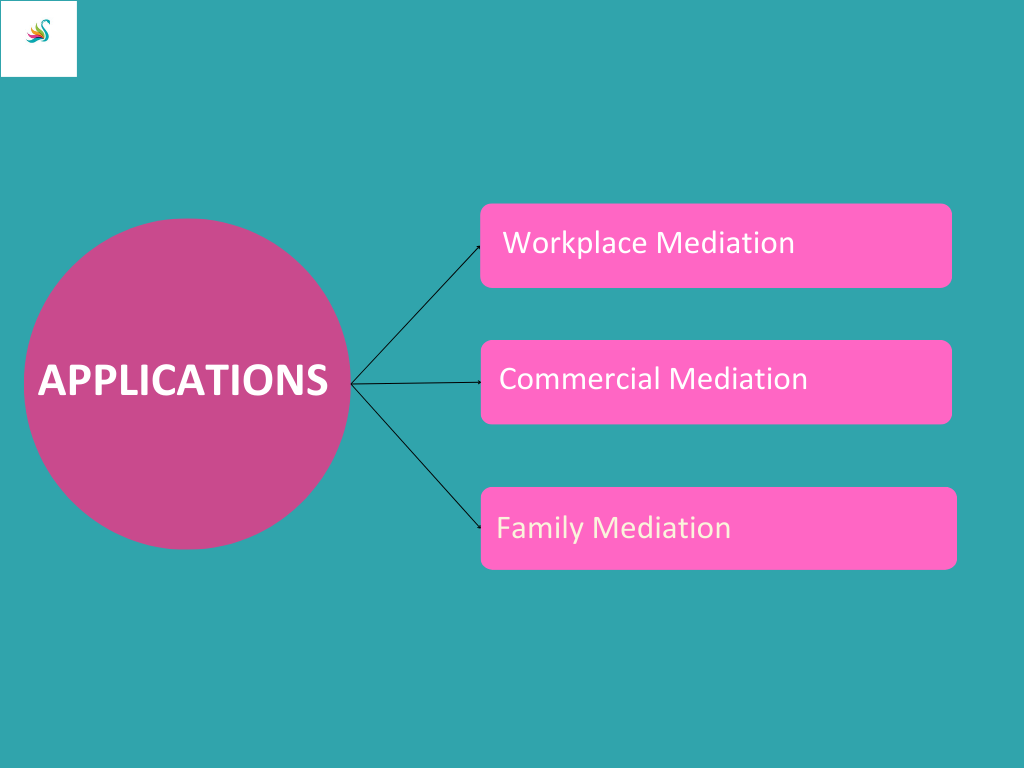
1. Workplace Mediation:
Workplace conflicts are common and can disrupt productivity and employee morale. Mediation offers a confidential and constructive approach to resolve issues such as interpersonal conflicts, misunderstandings, harassment claims, or disagreements over work-related matters. A trained mediator can help employees and employers communicate effectively, identify underlying issues, and develop solutions that foster a harmonious work environment.
Real-life Case Study: XYZ Corporation
XYZ Corporation, a multinational company, faced a conflict between two departments over resource allocation. Tensions escalated, affecting cross-departmental collaboration and hindering project timelines. The HR department intervened and hired a professional mediator. Through the mediation process, the departments discussed their needs and concerns, leading to a compromise that optimized resource distribution, improved communication channels, and reestablished a collaborative work culture.
2. Commercial Mediation:
In the business world, disputes may arise between companies, suppliers, partners, or customers. Commercial mediation allows parties to resolve conflicts efficiently and cost-effectively while preserving business relationships. The mediator assists in identifying common interests and exploring potential solutions that meet both parties’ objectives.
Real-life Case Study: ABC Electronics vs. DEF Manufacturing
ABC Electronics, a consumer electronics manufacturer, had a contractual dispute with DEF Manufacturing, their key component supplier. The conflict threatened to disrupt production and incur significant losses for both companies. Engaging in mediation, they discovered that DEF Manufacturing faced logistical challenges. By creatively restructuring the delivery schedule and exploring alternative solutions, both parties agreed on a revised contract that ensured timely deliveries and improved their long-term partnership.
3. Family Mediation:
Family disputes can be emotionally draining and complex, involving matters such as divorce, child custody, inheritance, and eldercare. Mediation provides a supportive and non-adversarial process for families to address these issues, with the ultimate goal of promoting the well-being of all family members involved.
Real-life Case Study: Smith Family
The Smith family faced a contentious legal battle over the division of their late father’s estate. Engaging in mediation, they were able to express their concerns, emotions, and interests openly. The mediator guided them toward a fair distribution of assets that respected their father’s wishes and preserved sibling relationships, ultimately preventing a prolonged court battle.
Advantages of Mediation:
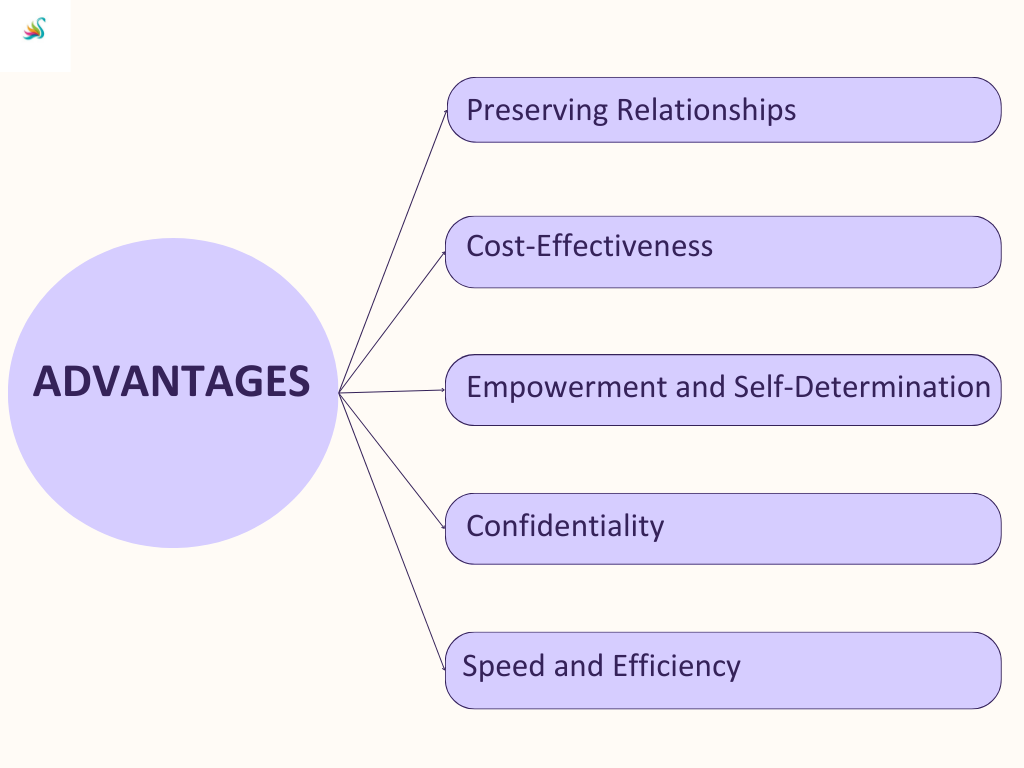
Preserving Relationships:
Unlike adversarial processes, mediation emphasizes cooperation and communication, allowing parties to preserve relationships even after the dispute is resolved. This is particularly valuable in scenarios where ongoing interactions are essential, such as in family or business contexts.
Cost-Effectiveness:
Mediation generally requires fewer resources and is less time-consuming than litigation or arbitration. As a result, it can save parties substantial costs and help them allocate resources more efficiently.
Empowerment and Self-Determination:
Mediation empowers parties to actively participate in shaping the resolution, leading to more satisfactory outcomes. Parties have a greater sense of ownership and commitment to the agreed-upon solution.
Confidentiality:
Confidentiality in mediation promotes open communication, allowing parties to discuss sensitive issues without fear of information being used against them in the future.
Speed and Efficiency:
Mediation is often faster than traditional legal processes, enabling parties to resolve disputes promptly and return to normalcy or productivity.
Limitations of Mediation:
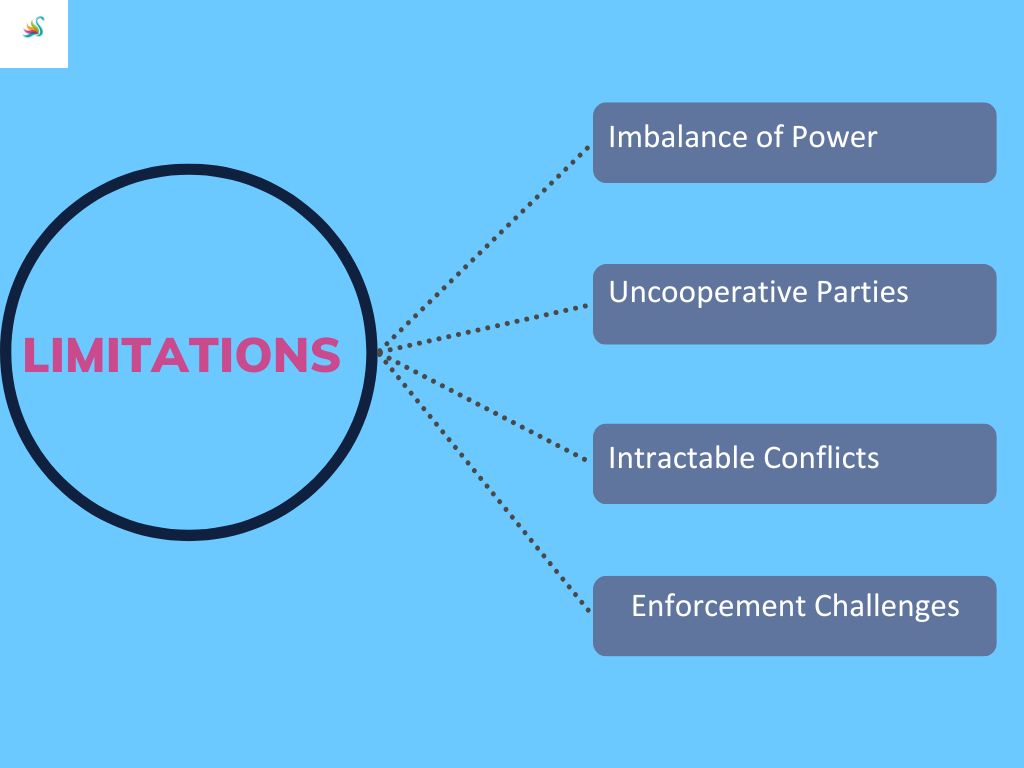
Imbalance of Power:
In some cases, there may be a significant power imbalance between the parties. The weaker party may feel pressured to agree to terms that do not fully address their needs or interests.
Uncooperative Parties:
Mediation requires voluntary participation and a willingness to collaborate. If one or more parties are uncooperative or unwilling to engage in good faith, the process may not be effective.
Intractable Conflicts:
Some disputes are deeply rooted and resistant to resolution through mediation alone. Such cases may require a more authoritative decision-making process, like arbitration or court intervention.
Enforcement Challenges:
While mediation can lead to mutually agreed-upon solutions, there is no guarantee that the parties will comply with the final agreement, leading to potential enforcement challenges.
Cultural Considerations in Mediation:
Culture plays a crucial role in shaping how individuals perceive conflicts, communicate, and seek resolution. Mediators must be sensitive to cultural differences to ensure an inclusive and effective process. Factors such as communication styles, decision-making norms, and conflict expression may vary significantly across cultures.
Real-life Case Study: Cross-Cultural Business Dispute
A dispute arose between an American technology company and an Indian manufacturing firm over a joint venture. The American company’s direct and assertive communication style clashed with the Indian company’s indirect and more reserved approach. The mediator recognized the cultural differences and facilitated the dialogue using a hybrid approach, combining directness with respect for hierarchy and consensus-building. This led to better understanding and resolution of the conflict.
Mediation and Win-Win Outcomes:
Mediation’s strength lies in its potential to generate win-win outcomes, where both parties benefit from the resolution. By focusing on underlying interests rather than positions, mediators can identify creative solutions that maximize gains for all involved.
Real-life Case Study: Labor Union Negotiation
A labor union representing factory workers engaged in mediation with the company’s management during contract negotiations. The initial positions seemed irreconcilable, with the union demanding higher wages and the company seeking cost reductions. The mediator facilitated discussions and identified shared interests between the parties, such as improved working conditions and increased productivity. Through brainstorming sessions, the mediator and the parties developed a profit-sharing model that tied wage increases to enhanced productivity levels. This innovative approach resulted in a win-win outcome, where the workers received higher wages based on their performance, and the company experienced increased efficiency and reduced labor turnover.
The Role of the Mediator:
The mediator plays a crucial role in guiding the mediation process and fostering an environment conducive to resolution. An effective mediator possesses a diverse set of skills, including:
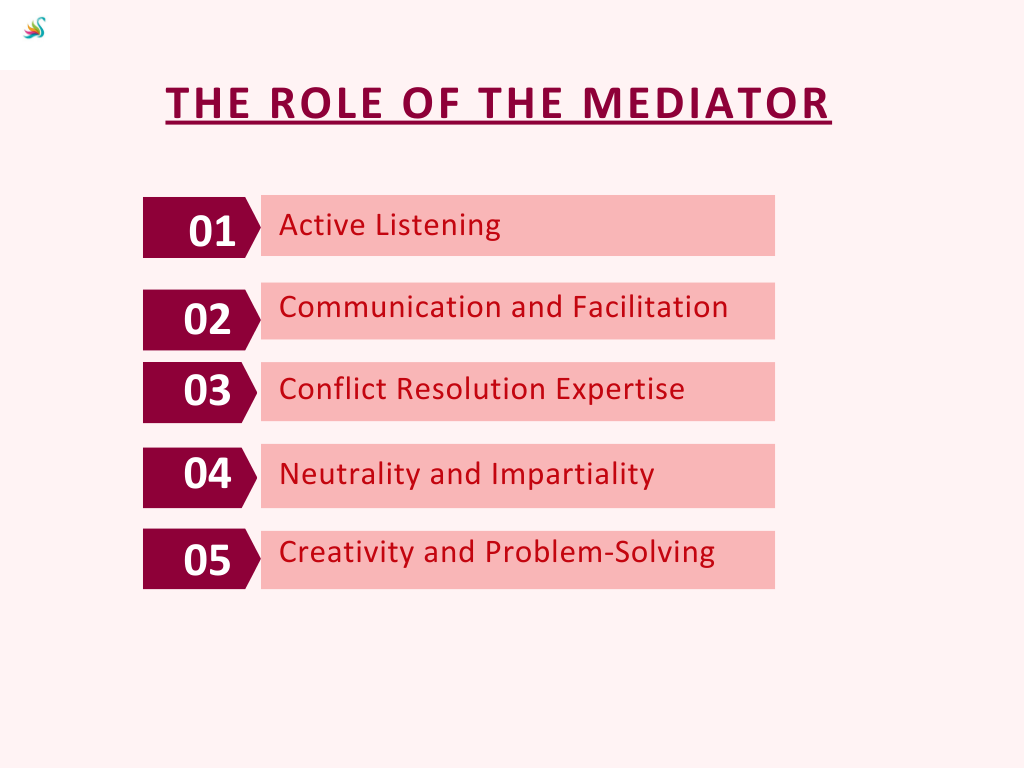
Active Listening: Mediators must attentively listen to parties’ concerns and perspectives, demonstrating empathy and understanding.
Communication and Facilitation: A mediator should facilitate productive communication between the parties, ensuring that each party has an opportunity to express their views and interests.
Conflict Resolution Expertise: Mediators should be skilled in identifying underlying issues and potential solutions, helping parties bridge gaps and find common ground.
Neutrality and Impartiality: Maintaining neutrality is fundamental to a mediator’s role, instilling trust and confidence in the process.
Creativity and Problem-Solving: Mediators must think creatively to generate alternative solutions that meet parties’ interests and move beyond rigid positions.
Mediation Research and Effectiveness:
Extensive research has been conducted to assess the effectiveness of mediation as a mode of dispute resolution. While results may vary depending on the context and parties involved, overall findings indicate several positive outcomes:
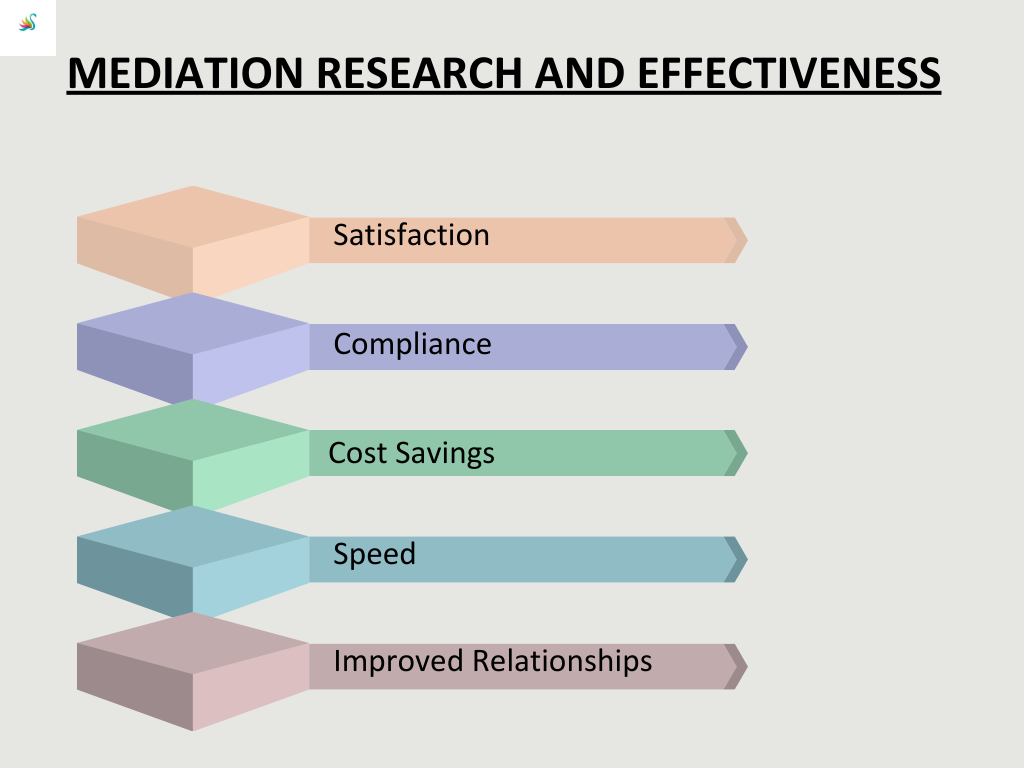
Satisfaction: Mediation participants often report higher satisfaction levels compared to parties involved in litigation or arbitration.
Compliance: Parties are more likely to comply with agreements reached through mediation since they actively participated in shaping the resolution.
Cost Savings: Mediation is generally more cost-effective than traditional litigation, reducing the financial burden on both parties and the justice system.
Speed: Mediation can expedite the resolution process, allowing parties to resolve conflicts promptly.
Improved Relationships: Mediation fosters communication and collaboration, leading to improved relationships between parties.
Conclusion:

Mediation, as a mode of dispute resolution, holds significant potential for resolving conflicts in various industries and scenarios. Its underlying principles of neutrality, voluntary participation, confidentiality, and self-determination create an environment conducive to constructive dialogue and problem-solving. Throughout this chapter, we have explored the diverse applications of mediation, from workplace and commercial disputes to family conflicts. Real-life case studies have illustrated the effectiveness of mediation in generating win-win outcomes, preserving relationships, and finding creative solutions.
While mediation offers numerous advantages, it is essential to acknowledge its limitations, particularly in cases of power imbalances or uncooperative parties. Cultural considerations also play a critical role in the mediation process, and mediators must be sensitive to diverse perspectives and communication styles. Despite these challenges, research findings support the overall effectiveness of mediation, with high levels of satisfaction, cost savings, and improved relationships.
As an evolving field, mediation continues to refine its practices and approaches, benefiting from ongoing research and the expertise of skilled mediators. Its ability to empower parties to take ownership of the resolution and maintain control over the outcome makes it a valuable and relevant method of dispute resolution in today’s complex and interconnected world. As individuals, businesses, and communities seek constructive ways to address conflicts and foster collaboration, mediation stands as a promising avenue for building sustainable and harmonious relationships.
